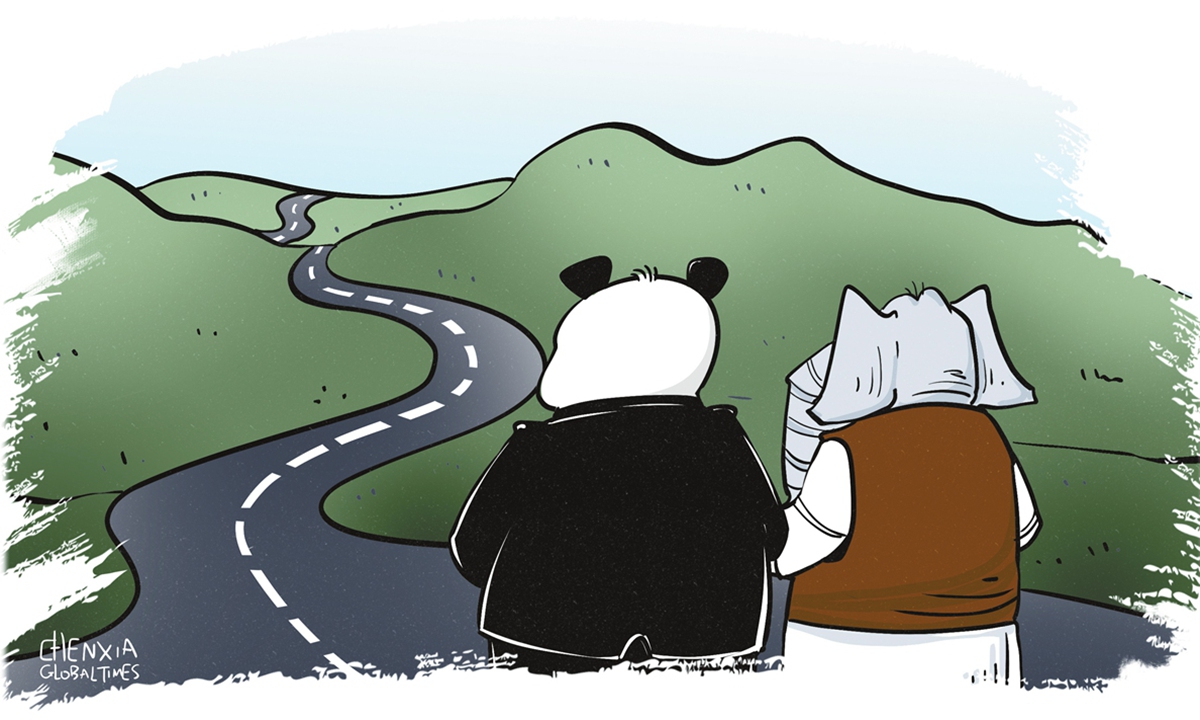
Illustration: Chen Xia/GT
With the successful implementation of the resolutions that China and India recently reached on issues concerning the border area, the China-India relationship, which has been lingering at a low level for over four years, is entering a window of opportunity for improvement. The Indian side has expressed its willingness to strengthen strategic communication with China, enhance strategic mutual trust, and expand mutually beneficial cooperation. It has also proposed relevant ideas and suggestions for improving and developing bilateral relations, leading to positive expectations for the future of the relationship between the two countries. However, some argue that the current shift in India's attitude is partly due to its widening differences with the US, Canada, and others over issues of "democracy" and "human rights," as well as considerations to reduce the resource consumption of winter troop deployments along the border. This has raised doubts about New Delhi's sincerity in improving relations with China.
Given India's previous inconsistencies in its policy toward China, these doubts are not without merit. Therefore, in addition to strategically eliminating erroneous concepts such as "relying on the US to counter China" and "war is inevitable between China and India," India also needs to work with China to promote the stable and healthy development of bilateral relations. Currently, India needs to make efforts in at least the following three areas.
First, it's necessary for India to rationally guide domestic public opinion to foster a positive understanding of China. The development of China-India relations requires a solid foundation of public opinion. It is particularly necessary for the government and mainstream media to properly guide rather than manipulate, public sentiment when issues arise in bilateral relations. However, in recent years, some Indian military and political officials have excessively exaggerated the contradictions and differences between China and India. Certain think tank scholars and media outlets have been eager to fabricate the "China military threat" narrative, frequently amplifying the "China threat" to attract attention and generate traffic. This has significantly poisoned the Indian public's perception of China.
A key issue in this situation is the role the Indian government should play and the signals it should send. In light of the recent positive momentum in China-India relations, it is crucial for the Indian side to clearly explain to its citizens the necessity and inevitability of improving and developing these relations.
Second, it is crucial to decisively abandon the practices of overstretching the concept of security and genuinely deepen economic and trade cooperation. Over the past 30 years, China-India economic and trade cooperation has made significant progress, with continuous improvements in cooperation mechanisms and steady growth in investment and trade. Economic and trade cooperation was once regarded as the "ballast stone" of bilateral relations. Both sides not only regard the development of a partnership as a core component of their strategic and cooperative relationship but have also established a high-level economic and trade dialogue mechanism to strengthen the alignment of economic development strategies, and promote balanced and sustainable growth in bilateral trade.
However, in recent years, India has increasingly tended to view its economic and trade relationship with China from a competitive, and even substitutive or hedging perspective. This shift has led to discriminatory economic and trade policies against China, such as banning Chinese applications, restricting Chinese investments in India, and suppressing Chinese enterprises operating in India, which have severely harmed the legitimate rights and interests of Chinese companies. Clearly, India has not benefited, and cannot benefit, from its discriminatory policies against China. The Indian government is also attempting to create a favorable business environment to attract more foreign direct investment. Restoring and strengthening economic and trade cooperation with China would be beneficial in achieving these goals.
Third, it is essential to eliminate artificial barriers as soon as possible and actively promote people-to-people exchanges. Amity between the people holds the key to sound state-to-state relations. As two ancient civilizations, China and India have historically benefited from cultural exchanges that provide positive energy to their bilateral relations. However, in recent years, the Indian side has imposed artificial obstacles, such as suspending direct flights to China, limiting visas, halting activities, and expelling journalists. These actions have led to a dramatic decline in bilateral people-to-people exchanges. China has consistently maintained an open attitude toward people-to-people exchanges between the two countries, while the Indian side's self-imposed barriers have left many rational individuals who hope for stable development in China-India relations feeling surprised and perplexed. The recent state of academic exchanges between China and India illustrates this point. Many Indian scholars have been invited to participate in academic activities in China, while it has become increasingly difficult for Chinese scholars to engage in face-to-face exchanges in India. The Indian government needs to promptly lift restrictions on people-to-people exchanges with China, allowing for more frequent interactions; otherwise, hopes for improved bilateral relations will be extinguished once again.
The current disengagement efforts at relevant border points are merely the first step toward easing border tensions and promoting the improvement of bilateral relations. China-India relations have not yet returned to the state they were in before the Galwan Valley conflict in 2020. Actions speak louder than words; we hope that India will quickly take concrete and positive actions on various issues related to bilateral cooperation, truly working to thaw the relationship between China and India.
The author is executive director of the Institute of South Asian Studies at the China Institutes of Contemporary International Relations. opinion@globaltimes.com.cn




